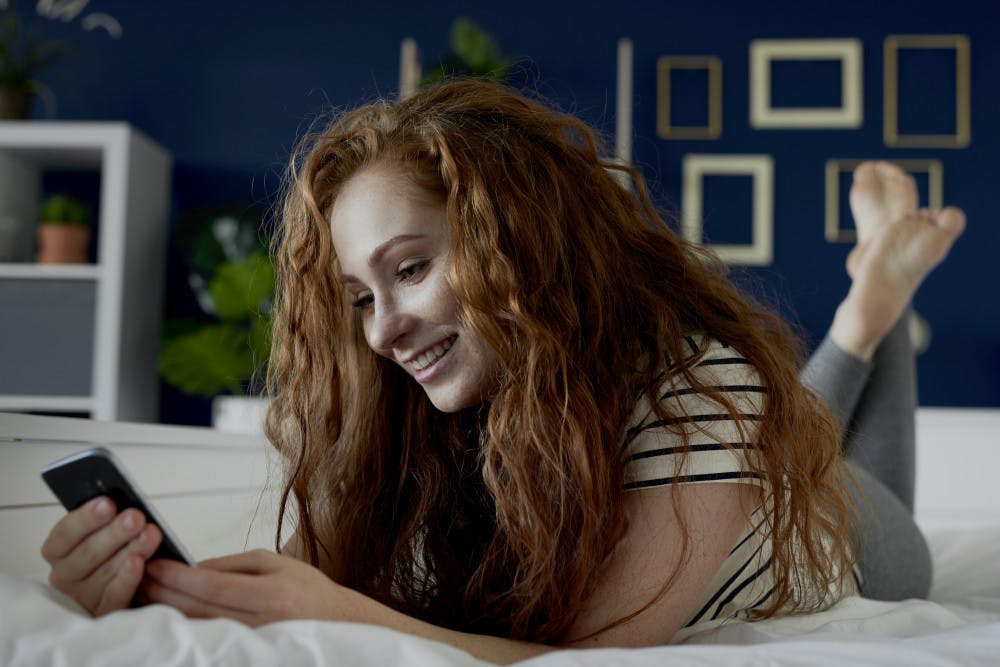By Victoria Giardina
Correspondent
Feb. 14 is around the corner, which means grabbing Ghirardelli and Godiva chocolates, painting a red-and-pink DIY gift and heading over to Hallmark to find a sentimental card for your special someone. But with Zoom university being the new normal, opportunities for romantic connections are limited.
That’s where dating apps come into play: multiple brands employing new strategies to find love, even if that begins with a swipe on a screen.
“I was on dating apps since the summer of 2019, and was getting pretty tired of it and ready to give up, but then I met my boyfriend, Mac, on Hinge in October,” said Sarah Armstrong, 21, senior marketing major. “It was the unexpected silver lining during the Coronavirus.”
Armstrong falls into the category of a “success story” — a relationship that actually works out, all thanks to app developers. And these fresh novellas of new love are relatively widespread. Pew Research Center posed in a recent study that just over half of Americans (54%) say relationships formed on dating apps are equally as successful as those beginning in person, where 5% advocate Internet-based relationships are more successful.
Though several singles are staying home this season, not everyone has the same views when it comes to electronically finding love. In a study of 227 students currently enrolled at the College, a majority of respondents (62%) said they wouldn’t consider creating an online dating profile before or on Valentine’s Day, while 28% already have one. Only 10% of N.J. based students said they would think about downloading a dating app.
To get a better picture of what campus-centered dating looks like, here is an overview of some of the findings:
- There are roughly 63% single students, 37% students in a relationship, and one person who is engaged or married.
- 94% of students said love was under lockdown during the pandemic, yet 6% met their significant other under quarantine guidelines.
- Regarding dating app usage, the majority of students (58%) swipe a couple of times a week, whereas 27% open the app once a week. Only 15% of students use dating apps daily.
Note: Please keep in mind that though this study was composed of 215 students, there are approximately 7,400 currently-enrolled students. This data is, for the most part, reflective of campus data, given this was not a mandatory survey sent out by The College of New Jersey.
“I didn’t think I would meet someone who can match my energy,” Armstrong said. “It’s so nice having someone who is my best friend and go-to person to see, especially when the world is pretty much shut down.”
Pre-psychology major Natalie Earl, 19, met her boyfriend, DJ, during the pandemic on Bumble in October. Everybody loves a good we-met-on-an-app story, but for some, it doesn’t work out. Junior English major Gina Mancuso, 21, was casually coasting on Tinder and Bumble and didn’t find much luck.
“I matched with this guy in October who lives in Philly and we started talking for a few days,” she said. “We had an amazing time together and then he goes MIA, for like, two months. That was my experience.”
The cycle of interest, excitement, and letdown is more common than initially thought. Luckily, Beth Sonnenberg, LCSW, N.J. based relationship expert, shares her expertise on college dating, as well as how to combat feelings of anxiety and loneliness.
“People are becoming pickier on who they engage with because the stakes are higher, if they’re going to take it to the next level and meet in person,” she said. “On the flipside, people are also more motivated if they’re single, with some being extra lonely during these times as well.”
At the College, 61% of students said they love Valentine’s Day but, for the other 39%, it’s a dreadful day. Bumble’s U.S. Public Relations Manager Elizabeth Song shared that, in a private company study, more than 90% of people are unsure of what to do this Valentine’s Day. To combat Covid-19 holiday confusion, Sonnenberg recommends being extra proactive to schedule virtual get-togethers with friends, including card games and Netflix watch parties.
Sonnenberg explained how college students have more time now, simply because visits to gyms and restaurants are fewer than they once were pre-pandemic. This is directly linked to an upward trend in the creation of new dating profiles, though a majority of students say dating apps aren’t for them. OkCupid experienced a 10% increase in matches with 20% more conversations, as well as 94% survey respondents telling the dating service they will continue to date in a virtual setting, according to the company’s blog post sent by Global Communications and PR Manager Michael Kaye.
Video chats and interactive getting-to-know you activities housed in the app — implemented by popular services like Bumble, Hinge, and Tinder — have added to this positive trend.
“Dating apps open the possibilities more, and even takes some of the pressure off to go out and find someone when you’re out and about,” Sonnenberg adds. “You don’t have to be a great flirt to respond to people, and some of these dating apps ask good questions.” This includes, “A quality I’m looking for in a plus-one wedding date,” — the Hinge conversation starter starting my seven-month relationship with my boyfriend, Michael, in June.
“I think people talk about the dating apps with dread, but a majority of people these days are meeting their boyfriends, girlfriends, and spouses on dating apps,” Sonnenberg summed up. “It’s the place most of these connections are happening.”
Note: If you are experiencing feelings of depression during this time, please visit the College’s Mental Health Services (MHS). For relationship concerns, the College’s Anti-Violence Initiatives (AVI) is a wonderful resource to assist with your personal needs.







